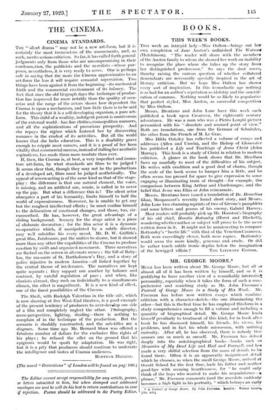BOOKS .
THIS WEEK'S BOOKS.
Tms week an intrepid lady—Miss Oulton—brings out her own completion of Jane Austen's unfinished The Watson* (Hutchinson). " The reader will share with the members of the Austen family to whom she showed her work an inability to recognize the place where she takes up the story from her distinguished predecessor." So says the dust cover, thereby raising the curious question of whether collateral descendants are necessarily specially inspired in the art of literary criticism. But we hope Miss Oulton has shown every sort of inspiration. In this iconoclastic age nothing is so bad for an author's reputation as idolatry and the sanctifi- cation of commas. Nothing would be so likely to popularize that perfect stylist, Miss Austen, as successful competition by Miss Oulton.
Messrs. Brentano and John Lane have this week each published a book upon Casanova, the eighteenth century adventurer. He was a man who was a Pietro Longlii picture personified with his " dissolute and amused point of view." Both are translations, one from the German of Schnitzler, the other from the French of M. Le Gras.
Miss Hilda Oakeley has collected a volume of essays and addresses (Allen and Unwin), and the Bishop of Gloucester has published a Life and Teachings of Jesus Christ (John Murray). This book is a study of Christ in relation to modern criticism. A glance at the book shows that Dr. Headlam faces up manfully to most of the difficulties of his subject. He writes with erudition and a good deal of charm, though the scale of the book seems to hamper him a little, and he often seems too pressed for space to give expression to some engaging or illuminating train of thought—for example, the comparison between King Arthur and Charlemagne, and the belief that Jesus was Elias or John reincarnate.
Messrs. Brentano have issued a translation of Dr. Heraclius Gloss, Maupassant's recently found short story, and Messrs. John Lane two charming reprints of two of Greene's pamphlets and sonic letters and poems of his enemy, Gabriel Harvey.
Most readers will probably pick up Mr. Houston's biography of his old chief, Horatio Bottontley (Hurst and Blackett), wondering whether author or subject will prove to be the more written down in it. It might not be uninteresting to compare Bottomley's "hectic life" with that of the Venetian Casanova. Both were exceedingly clever, both were rogues. Bottomley would seem the more kindly, generous and crude. Or did he rather touch subtle ironic depths below the imagination










































 Previous page
Previous page